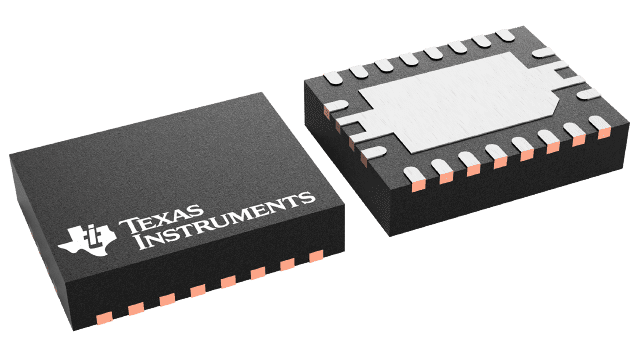
BQ24038RHLR
ActiveSTANDALONE 1-CELL, 2-A BATTERY CHARGER WITH DYNAMIC POWER PATH, OUTPUT REG. TO 4.4V, VBAT 4.4V
Deep-Dive with AI
Search across all available documentation for this part.

BQ24038RHLR
ActiveSTANDALONE 1-CELL, 2-A BATTERY CHARGER WITH DYNAMIC POWER PATH, OUTPUT REG. TO 4.4V, VBAT 4.4V
Technical Specifications
Parameters and characteristics commom to parts in this series
| Specification | BQ24038RHLR | BQ24038 Series |
|---|---|---|
| Battery Chemistry | Lithium Ion/Polymer | Lithium Ion/Polymer |
| Battery Pack Voltage | 4.36 V | 4.36 V |
| Charge Current - Max [Max] | 1.5 A | 1.5 A |
| Contents | - | Board(s) |
| Current - Charging | Constant - Programmable | Constant - Programmable |
| Embedded | - | False |
| Fault Protection | Reverse Current, Short Circuit, Over Temperature | Reverse Current, Short Circuit, Over Temperature |
| Function | - | Battery Charger |
| Interface | USB | USB |
| Mounting Type | Surface Mount | Surface Mount |
| Number of Cells | 1 | 1 |
| Operating Temperature [Max] | 125 ¯C | 125 ¯C |
| Operating Temperature [Min] | -40 °C | -40 °C |
| Package / Case | 20-VFQFN Exposed Pad | 20-VFQFN Exposed Pad |
| Primary Attributes | - | Li-Ion / Li-Pol (1 Cell) |
| Programmable Features | Current, Timer | Current, Timer |
| Supplied Contents | - | Board(s) |
| Supplier Device Package | 20-VQFN (3.5x4.5) | 20-VQFN (3.5x4.5) |
| Type | - | Power Management |
| Utilized IC / Part | - | BQ24038 |
| Voltage - Supply (Max) [Max] | 16 V | 16 V |
Pricing
Prices provided here are for design reference only. For realtime values and availability, please visit the distributors directly
| Distributor | Package | Quantity | $ | |
|---|---|---|---|---|
| Texas Instruments | LARGE T&R | 1 | $ 3.61 | |
| 100 | $ 3.17 | |||
| 250 | $ 2.22 | |||
| 1000 | $ 1.79 | |||
BQ24038 Series
Standalone 1-cell, 2-A battery charger with dynamic Power Path, output reg. to 4.4V, Vbat 4.4V
| Part | Mounting Type | Fault Protection | Interface | Battery Chemistry | Current - Charging | Battery Pack Voltage | Supplier Device Package | Voltage - Supply (Max) [Max] | Number of Cells | Charge Current - Max [Max] | Operating Temperature [Max] | Operating Temperature [Min] | Package / Case | Programmable Features | Type | Function | Supplied Contents | Utilized IC / Part | Primary Attributes | Contents | Embedded |
|---|---|---|---|---|---|---|---|---|---|---|---|---|---|---|---|---|---|---|---|---|---|
Texas Instruments BQ24038RHLR | Surface Mount | Over Temperature, Reverse Current, Short Circuit | USB | Lithium Ion/Polymer | Constant - Programmable | 4.36 V | 20-VQFN (3.5x4.5) | 16 V | 1 | 1.5 A | 125 ¯C | -40 °C | 20-VFQFN Exposed Pad | Current, Timer | |||||||
Texas Instruments BQ24038EVM | Power Management | Battery Charger | Board(s) | BQ24038 | Li-Ion / Li-Pol (1 Cell) | Board(s) | |||||||||||||||
Texas Instruments BQ24038RHLT | Surface Mount | Over Temperature, Reverse Current, Short Circuit | USB | Lithium Ion/Polymer | Constant - Programmable | 4.36 V | 20-VQFN (3.5x4.5) | 16 V | 1 | 1.5 A | 125 ¯C | -40 °C | 20-VFQFN Exposed Pad | Current, Timer |
Description
General part information
BQ24038 Series
The bqTINY™ III-series of devices are highly integrated Li-ion linear chargers and system power-path management devices targeted at space-limited portable applications. The bqTINY III-series offer integrated USB-port and DC supply (AC adapter), power-path management with autonomous power-source selection, power FETs and current sensors, high accuracy current and voltage regulation, charge status, and charge termination, in a single monolithic device.
The bqTINY III-series powers the system while independently charging the battery. This feature reduces the charge and discharge cycles on the battery, allows for proper charge termination and allows the system to run with an absent or defective battery pack. This feature also allows for the system to instantaneously turn on from an external power source in the case of a deeply discharged battery pack. The IC design is focused on supplying continuous power to the system when available from the AC, USB, or battery sources.
The power select pin, PSEL, defines which input source is to be used first (primary source – AC or USB). If the primary source is not available, then the IC automatically switches over to the othersecondarysource if available or the battery as the last option. If the PSEL is set low, the USB input is selected first and if not available, the AC line is selected (if available) but programmed to a USB input limiting rate (100 mA/500 mA max). This feature allows the use of one input connector, where the host programs the PSEL pin according to what source is connected (AC adaptor or USB port).


